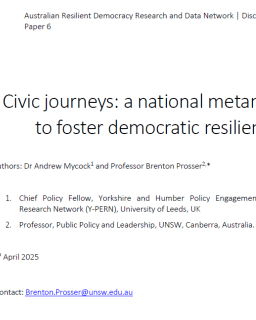
Abstract
National surveys are reporting a steady decline in democratic participation, public trust and civic engagement in Australia. At the same time, there has been an abundance of civic initiatives and community programs that seek to increase access to opportunities to participate. Many initiatives cite evidence of impact, but there remains a gap in integrated, long-term and systemic insight on what works collectively and cumulatively across a person’s life course. In this paper, we outline ‘civic journeys’, both as a conceptual and practical tool to better understand how, where and when life-long active citizenship can be best supported and enabled. We start with a focus on connecting data collection and disaggregating initiative interventions at key points across a life course. We illustrate the policy relevance of this for government and communities as a way to understand how compounding experiences shape levels of engagement, as well as a means to design programs that maximise opportunities to engage in democratic processes and be prepared to navigate multiple ressures and shocks. We conclude with discussion on this concept’s potential to inform future policy, research, and practice in Australia.
File attachments
| Attachment | Size |
|---|---|
| Resilient-Democracy---Discussion-Paper-06---Mycock-Prosser---Final.pdf(803.19 KB) | 803.19 KB |